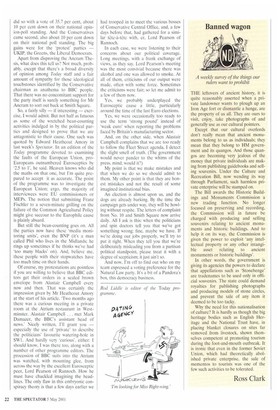Banned wagon
A weekly survey of the things our rulers want to prohibit
THE leftovers of ancient history, it is quite reasonably asserted when a private landowner wants to plough up an Iron Age fort or dismantle a henge, are the property of us all. They are ours to visit, enjoy, take photographs of and generally use as our cultural pointers.
Except that our cultural overlords don't really mean that ancient monuments belong to us as individuals; they mean that they belong to HM government and its quangos. And those quangos are becoming very jealous of the money that private individuals are making from publishing guidebooks and selling souvenirs. Under the Culture and Recreation Bill, now wending its way through Parliament, such harmless private enterprise will be stamped on.
The Bill awards the Historic Buildings and Monuments Commission a new trading function. No longer focused on preserving and recording, the Commission will in future be charged with producing and selling souvenirs relating to ancient monuments and historic buildings. And to help it on its way, the Commission is given the power to exploit 'any intellectual property or any other intangible asset relating to ancient monuments or historic buildings'.
In other words, the government is giving its agencies the powers to declare that appellations such as 'Stonehenge' are tradenames to be used only in official souvenirs. The state could demand royalties for publishing photographs and producing models of stone circles, and prevent the sale of any item it deemed to be too tacky.
Why the need for this nationalisation of culture? It is hardly as though the big heritage bodies such as English Heritage and the National Trust have, in placing blanket closures on sites far removed from livestock, shown themselves competent at promoting tourism during the foot-and-mouth outbreak. It is ironic that even in the former Soviet Union, which had theoretically abolished private enterprise, the sale of mementos to tourists was one of the few such activities to be tolerated.
Ross Clark










































































 Previous page
Previous page